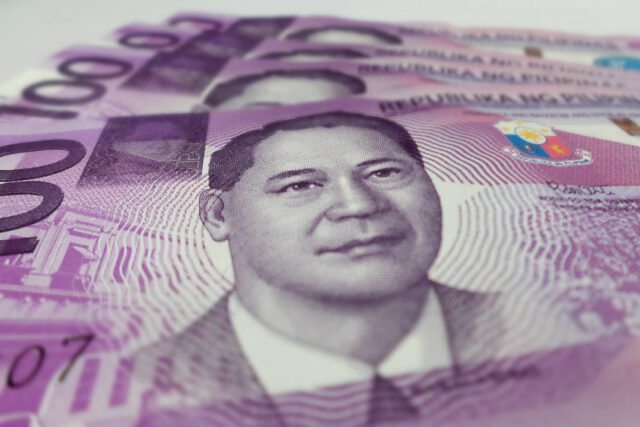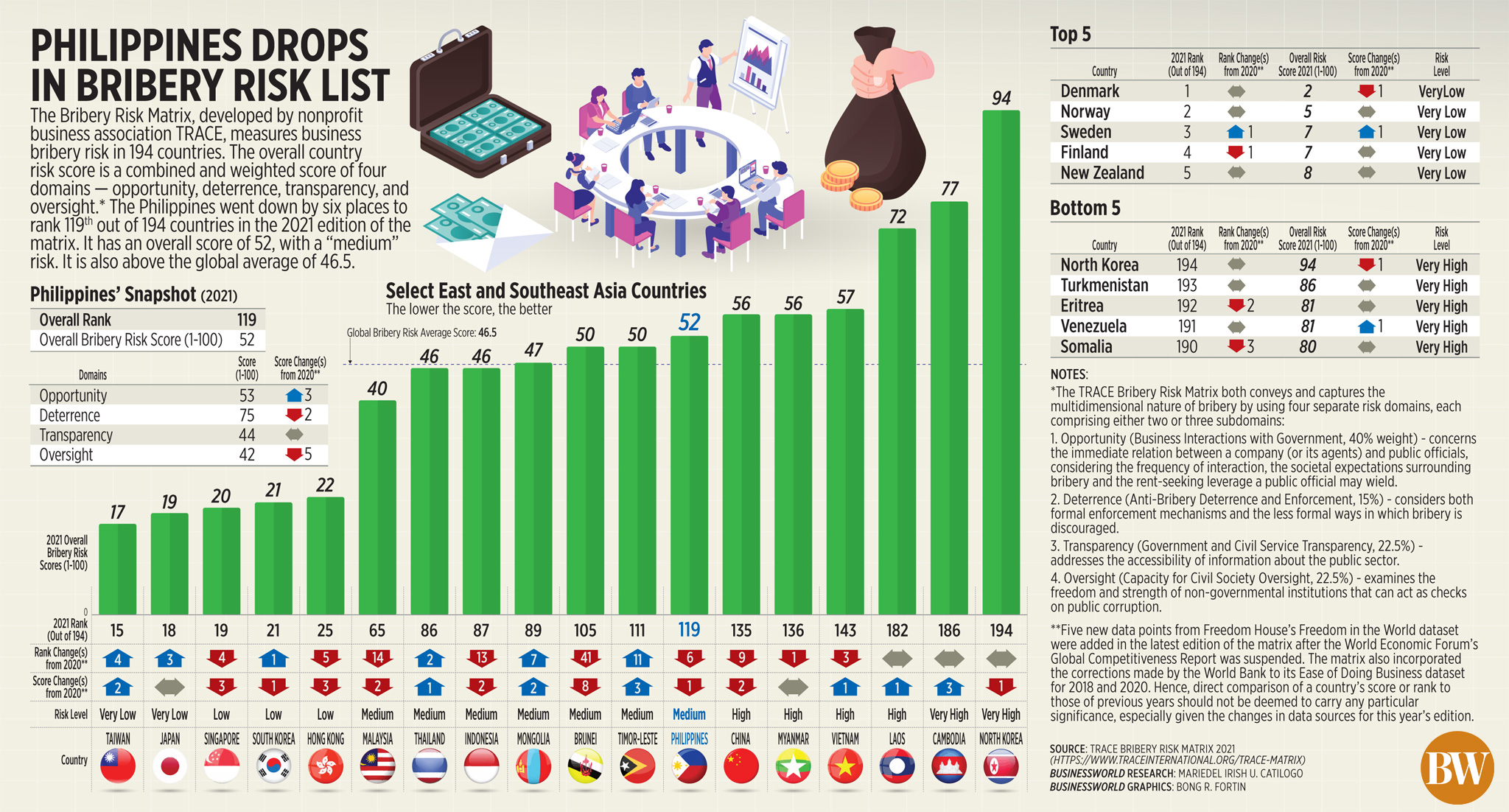
By Revin Mikhael D. Ochave, Reporter
THE PHILIPPINES ranked 119th out of 194 countries globally in a matrix that measures the risk of businesses in experiencing public sector bribery.
The 2021 Bribery Risk Matrix by United States-based business association TRACE showed the Philippines slipped six spots from 113th place in the previous report.
Based on the matrix, the Philippines has a “medium” risk level after getting an overall risk score of 52, lower than the previous year’s score of 51.
According to TRACE, the risk score ranges from 1 (lowest risk) to 100 (highest risk). TRACE said the matrix is “designed to reflect our current best understanding of country-level bribery risk conditions worldwide.”
The Philippines lagged behind Taiwan (15th), Singapore (19th), Malaysia (65th), Thailand (86th), Indonesia (87th), Brunei (105th), and East Timor (111th).
On the other hand, it placed higher than Myanmar (136th), Vietnam (143rd), Laos (182nd), and Cambodia (186th).
TRACE said the matrix examines four areas that indicate potential business bribery risk: business interactions with government which looks at regulatory burden, expectation of bribes, and contact with government; anti-bribery deterrence and enforcement which looks at factors that deter bribery; government and civil service transparency which refers to regulations; and capacity for civil society oversight or the extent of press freedom and civic engagement.
According to the matrix, the Philippines scored 53 in business interactions with government, 75 in anti-bribery deterrence and enforcement, 44 in government and civil service transparency, and 42 in capacity for civil society oversight.
Zy-za Nadine Suzara, Institute for Leadership, Empowerment, and Democracy (I-LEAD) executive director, said in a mobile phone message that bribery and other forms of corruption in business and government interactions only thrive when there is lack of government transparency.
“A high degree of opacity in government prevents media and civil society from monitoring government transactions and processes. It is difficult to demand accountability from an administration that way,” Ms. Suzara said.
Michael Henry Ll. Yusingco, a senior research fellow at the Ateneo de Manila University Policy Center, said in an e-mail interview that bribery is a complex problem which needs a lot of time and effort to address.
“Bribery is one of the criminal acts that fall under the umbrella term ‘graft and corruption.’ This happens with the lowliest government official to even the highest public official in the land. This can come in the form of a direct and straightforward quid pro quo transaction. But sometimes it can also manifest through multi-layered and multi-party arrangements,” Mr. Yusingco said.
“This is a very complex and deeply rooted problem. This will not be solved overnight. Getting rid of this problem, or at least lessening its pervasiveness in our politics and governance, is going to take a lot of time and effort,” he added.
IBON Foundation Executive Director Sonny A. Africa said in a Facebook messenger chat that the country’s ranking should be “taken with a grain of salt.”
“Placing in the bottom third of 194 countries will resonate with many dissatisfied with corruption in the country but over reading it may even distract from more basic socioeconomic problems or shut out possible solutions,” Mr. Africa said.
“Fixing bribery without reforming the way the economy and social services is structured will not necessarily improve development outcomes,” he added.
According to Ms. Suzara, the country can improve its performance in the bribery matrix by enacting the Freedom of Information (FOI) bill.
“The next administration should go beyond the Duterte administration’s token measures on anti-corruption and institutionalize measures that would ensure open and transparent government. One concrete step towards that direction is to enact the FOI bill so that transparency and accountability can once again be the norms in governance,” Ms. Suzara said.
For Mr. Yusingco, the Philippines can reduce bribery risk by accelerating the digitalization of government transactions, especially those that involve money.
“The digitalization of government must be pursued relentlessly. The goal is to minimize face-to-face interaction between civil servants and the public. Transacting with government should now be done electronically as the norm subject only to a few exceptions,” Mr. Yusingco said.
“Obviously, digitalization does not mean public service must become impersonal and unsympathetic. The public’s welfare is still paramount. But some transactions, especially ones that involve money, must now be done online,” he added.
Further, Mr. Yusingco said people should not tolerate bribery at all, especially in government.
“This is very hard to do since people have been accustomed to ‘speeding up’ transactions with government agencies by paying off the right people. There must be a cultural shift in dealing with government agencies and that has to begin with citizens being strong in resisting bribery,” Mr. Yusingco said.
For all the latest Business News Click Here
For the latest news and updates, follow us on Google News.

